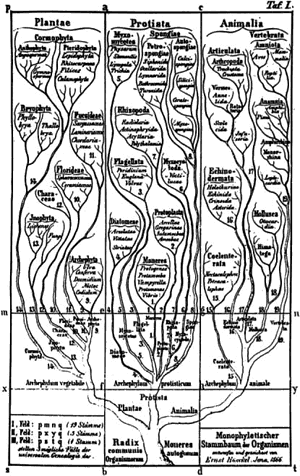I am the pinnacle of evolution!
 It's true. I am the pinnacle of evolution. Or rather, my son is. And so is my cat. And the rat digging in my garbage. And the slime mold growing in the drain in my tub.
It's true. I am the pinnacle of evolution. Or rather, my son is. And so is my cat. And the rat digging in my garbage. And the slime mold growing in the drain in my tub.
Most people have this mistaken idea of evolution based off of an evolutionary tree drawn by Haeckel over a hundred years ago, that evolution is this tree of progress building from "lower" organisms like sponges, up to molluscs and then to the pinnacle: man.
That mistaken understanding of evolution makes it easy to make the mistake that we have to keep humanity "pure" of undesirable genotypes, and can be used to rationalize horrors like eugenics. But it's based on a poor understanding of evolution. It's a pity, because from conversations with other biologists, I think that it's not just a misunderstanding that lay people have, it's one that many biologists have as well.
Every organism alive today is highly evolved for its niche. Calling a dog more evolved than a bacterium is simply incorrect. As Norman Pace said* this week at the American Society for Microbiology meeting, "If you think that a dog is more highly evolved than a Prochlorococcus bacterium, do the experiment. Take them both out and drop them in the middle of the Sargasso Sea and see which one survives." The point he was trying to make was that each individual organism alive today is highly evolved, and making statements about the degree of evolution involved is incorrect. A bacterium is an incredibly evolved and efficient organism that fits very well in the niche that it lives. It has undergone many millions of years of evolution to produce a remarkable organism, just like a human (in fact, it has undergone orders of magnitude more generations, suggesting if anything, that the bacterium is more highly evolved).
PZ Myers makes a similar point at Pharyngula:
I like to compare humans with chimpanzees—are we more complex? I don't think there is any way to say that we are. We have about the same number of genes and a genome that is about the same size and that is organized in a roughly similar way. There is some speculation about the differences in our genomes that lead to the obvious differences in our morphology, but they don't postulate any increases in complexity.Norman Pace draws evolutionary relationships between the major phylogenetic groups like this:

That every living creature alive today is at the end of those triangles, and all the "less" evolved organisms make up the lines behind them. That is, anything "less" evolved is by definition extinct. The simpler organisms have been outcompeted, and are dead. (He also suggests that part of the problem is the terminology that we use, but I'll save that discussion for another day).
I would suggest that the most useful way to visually depict evolutionary relationships would be a 3 dimensional sphere. Every living organism is on the outer edge of that sphere, and failed branches of life are in the interior of the sphere. Indeed, the last common universal ancestor would be at the center of said sphere. As such, we all represent the pinnacle of evolution, and are all well-adapted to the niche that we occupy.
*not a direct quote, but pretty close on the mark












1 comment:
Perhaps, and it is an interesting point. But it all depends uon your idea of evolution and how relative you get. Within a genus, you can point out a more evolved form of a sister animal. Or rather, more evolved on a sccale to new genuses. That's why sometimes sister species will compete with each other until one is extinct. Usually, the one that goes away is less evolved than the winner sister species. And also, evolution as far as higher forms of life or conciousness can compare dogs and bacteria by those standards...
(I've held to the fact that I am the pinnacle of evolution and told everyone that since the seventh grade as inside joke. Now, with this piece of evidence, I geuss I'm not lying!)
Post a Comment